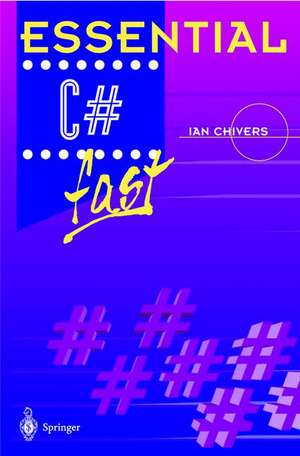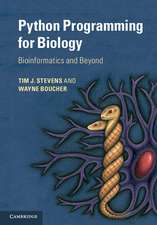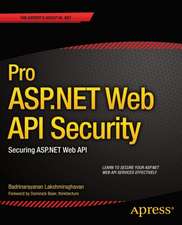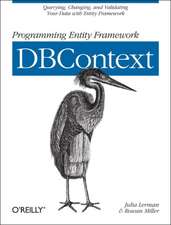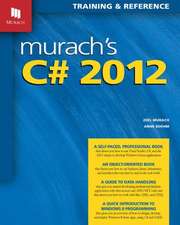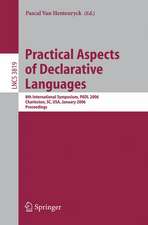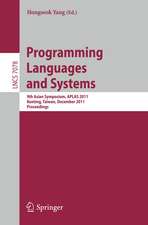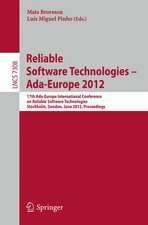Essential C# fast: Essential Series
Autor Ian Chiversen Limba Engleză Paperback – 25 apr 2003
Din seria Essential Series
-
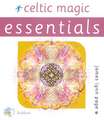 Preț: 40.82 lei
Preț: 40.82 lei - 20%
 Preț: 333.72 lei
Preț: 333.72 lei - 20%
 Preț: 334.86 lei
Preț: 334.86 lei - 20%
 Preț: 330.56 lei
Preț: 330.56 lei - 20%
 Preț: 331.40 lei
Preț: 331.40 lei - 20%
 Preț: 308.87 lei
Preț: 308.87 lei - 20%
 Preț: 329.58 lei
Preț: 329.58 lei - 20%
 Preț: 330.24 lei
Preț: 330.24 lei - 20%
 Preț: 273.32 lei
Preț: 273.32 lei - 20%
 Preț: 333.40 lei
Preț: 333.40 lei - 20%
 Preț: 198.66 lei
Preț: 198.66 lei - 20%
 Preț: 329.26 lei
Preț: 329.26 lei - 20%
 Preț: 304.94 lei
Preț: 304.94 lei - 20%
 Preț: 641.49 lei
Preț: 641.49 lei - 20%
 Preț: 327.12 lei
Preț: 327.12 lei - 20%
 Preț: 328.60 lei
Preț: 328.60 lei - 20%
 Preț: 333.54 lei
Preț: 333.54 lei - 20%
 Preț: 239.43 lei
Preț: 239.43 lei - 20%
 Preț: 334.38 lei
Preț: 334.38 lei - 20%
 Preț: 638.69 lei
Preț: 638.69 lei - 20%
 Preț: 328.79 lei
Preț: 328.79 lei - 20%
 Preț: 334.71 lei
Preț: 334.71 lei - 20%
 Preț: 639.02 lei
Preț: 639.02 lei - 20%
 Preț: 330.56 lei
Preț: 330.56 lei - 20%
 Preț: 327.29 lei
Preț: 327.29 lei - 20%
 Preț: 332.57 lei
Preț: 332.57 lei - 20%
 Preț: 641.67 lei
Preț: 641.67 lei
Preț: 308.07 lei
Preț vechi: 385.09 lei
-20% Nou
Puncte Express: 462
Preț estimativ în valută:
58.96€ • 61.39$ • 49.83£
58.96€ • 61.39$ • 49.83£
Carte tipărită la comandă
Livrare economică 10-24 martie
Preluare comenzi: 021 569.72.76
Specificații
ISBN-13: 9781852335625
ISBN-10: 1852335629
Pagini: 320
Ilustrații: XIII, 303 p.
Dimensiuni: 155 x 235 x 17 mm
Greutate: 0.53 kg
Ediția:Softcover reprint of the original 1st ed. 2003
Editura: SPRINGER LONDON
Colecția Springer
Seria Essential Series
Locul publicării:London, United Kingdom
ISBN-10: 1852335629
Pagini: 320
Ilustrații: XIII, 303 p.
Dimensiuni: 155 x 235 x 17 mm
Greutate: 0.53 kg
Ediția:Softcover reprint of the original 1st ed. 2003
Editura: SPRINGER LONDON
Colecția Springer
Seria Essential Series
Locul publicării:London, United Kingdom
Public țintă
Professional/practitionerCuprins
1. Overview.- 1.1 Assumptions.- 1.2 What Is Covered.- 1.3 System Requirements.- 1.4 C# History.- 1.5 Languages and Standards.- 1.6 Algorithms and Libraries.- 1.7 News Groups.- 1.8 Bibliography.- 2. Language Concepts.- 2.1 Programming Language Developments.- 2.2 C# Concepts and Terminology.- 2.3 Bibliography.- 3. An Introduction to Programming in C#.- 3.1 Introduction.- 3.2 Hello World Using the Console.- 3.3 Hello World Using Developer Studio.- 3.4 Console Application.- 3.5 SimpleText I/O.- 3.6 Simple Numeric I/O.- 3.7 On-Line Documentation.- 3.8 Key Concepts of C#.- 3.9 Summary.- 4. Arithmetic and Expressions.- 4.1 Introduction.- 4.2 Integral Types.- 4.3 Floating Point Types.- 4.4 The Decimal Type.- 4.5 Math Members.- 4.6 Operators.- 4.7 Simple and Aliased Types.- 4.8 Integer Arithmetic.- 4.9 Floating Point Arithmetic.- 4.10 Formatting Numbers.- 4.11 Escape Sequences.- 4.12 Literals.- 4.13 Arithmetic in Other languages.- 4.14 Summary.- 4.15 Bibliography.- 4.16 Problems.- 5. Some More on Data Types.- 5.1 Booleans.- 5.2 Characters and Strings.- 5.3 Value and Reference Types.- 5.4 Enum Types.- 5.5 Other Types.- 5.6 C# Keywords.- 5.7 Comments.- 5.8 Summary.- 5.9 Problem.- 6. Strings.- 6.1 Basic String Manipulation.- 6.2 Concatenating and Splitting Strings.- 6.3 Using the Length Property and IndexOf Method.- 6.4 String Constructors, Fields, Methods, Operators and Properties.- 6.5 Problems.- 7. Arrays.- 7.1 Introduction.- 7.2 One-dimensional Arrays.- 7.3 Array Initialization.- 7.4 Simple Two-dimensional Arrays.- 7.5 Arrays of Arrays.- 7.6 Ragged Arrays.- 7.7 List of Array Members.- 7.8 Summary.- 7.9 Problems.- 8. Control Structures.- 8.1 Statement End Points and Reachability.- 8.2 Types of Statements.- 8.3 Selection Statements.- 8.4 Iteration Statements.- 8.5 Jump Statements.- 8.6 Exception Handling Using Try, Catch Throw.- 8.7 Summary.- 8.8 Bibliography.- 8.9 Problems.- 9. Input and Output.- 9.1 Introduction.- 9.2 Using the Console Class.- 9.3 Using the StreamReader Class.- 9.4 Specifying the File Location.- 9.5 Reading from Standard Input.- 9.6 Reading from the Command Line.- 9.7 Using StreamReader and StreamWriter with Hard-coded File Names.- 9.8 Reading a File from a Web Server.- 9.9 Reading Tabular Data from a Text File.- 9.10 The System.Console Class.- 9.11 The StreamReader Class.- 9.12 The System.IO.File Class.- 9.13 Problems.- 10. Exceptions.- 10.1 Introduction.- 10.2 The Exception Hierarchy.- 10.3 Integer Arithmetic Exceptions.- 10.4 Floating Point Exceptions.- 10.5 Summary.- 11. Threads.- 11.1 Introduction.- 11.2 Basic Thread Syntax.- 11.3 Using the Sleep Method.- 11.4 Threads and Static Variables.- 11.5 Threads with Start, Suspend and Resume.- 11.6 Thread Priority.- 11.7 Thread States.- 11.8 Microsoft Examples.- 11.9 Bibliography.- 11.10 Problems.- 12. Structs.- 12.1 Introduction.- 12.2 Basic Syntax.- 12.3 Simple Example.- 13. Classes.- 13.1 Basic Class Syntax.- 13.2 Examples.- 13.3 Passing Parameters.- 13.4 Instance and Static Members.- 13.5 Additional Syntax.- 13.6 Bibliography.- 14. The System. Collections Namespace.- 14.1 Introduction.- 14.2 Using the Hashtable Class.- 14.3 Using the SortedList Class.- 14.4 A Spelling Checker.- 14.5 Summary.- 14.6 Bibliography.- 15. Operator Overloading.- 15.1 Complex Numbers.- 15.2 Complex Arithmetic in Other Languages.- 15.3 Complex Numbers Using the Float Data Type.- 15.4 Complex Numbers Using the Double Data Type.- 15.5 Complex Arithmetic Using Implicit Type Conversions.- 15.6 Complex Arithmetic Using Explicit Type Conversions.- 15.7 Arrays of Complex Numbers.- 15.8 Summary.- 16. An Introduction to Windows Programming.- 16.1 Introduction.- 16.2 The .Net IDE.- 16.3 Buttons and Event Handling Using a MessageBox Control.- 16.4 Using a TextBox to Accept User Input.- 16.5 Using a RichTextBox to Display Program Output.- 16.6 Using a PictureBox to Display an Image.- 16.7 Selecting a File with the OpenFileDialog Control.- 16.8 Text and Graphics Using GDI+.- 16.9 Converting a Console to a Windows Application.- 16.10 Bibliography.- 17. Additional Language Features.- 17.1 Events and Event Handling.- 17.2 Interfaces.- 17.3 Attributes.- 17.4 Delegates.- 17.5 Windows-based Programming.- 17.6 Namespaces.- 17.7 Assemblies and Versioning.- 17.8 Bibliography.- 18. Where Next?.- 18.1 Online Documentation.- 18.2 Examples.- 18.3 Tutorials.- 18.4 Wizards.- 18.5 Web Sources.- 18.6 Books.- 18.7 Microsoft.- 18.8 Source Code.- 18.9 Coda.- Appendix A.- Default Coordinate System Example in C++.
Caracteristici
A quick, practical introduction to the C# programming language Includes lots of clear simple examples, highlighting the core features of the language This is a new language, and there are not many introductory books on the full release version of C# yet - which came out early in 2002 Includes supplementary material: sn.pub/extras
